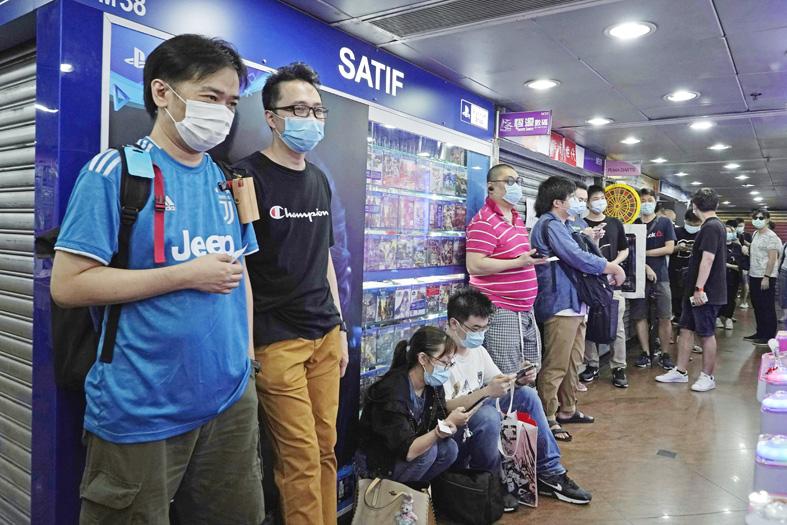Sony Corp raised its fiscal-year operating profit outlook by 13 percent to ¥700 billion (US$6.7 billion) as its video game unit rode a surge in demand for entertainment from home-bound consumers.
The forecast, up from a previous ¥620 billion, surpassed the average analyst expectation of ¥658.9 billion and precedes the PlayStation 5’s highly anticipated debut next month. Sony aims to sell more than 7.6 million units by the end of March, more than the PlayStation 4 managed in its first year, chief financial officer Hiroki Totoki said.
Sony’s outlook hike underscores how the entertainment giant is benefiting from a global COVID-19 era consumer shift. While sales of its smartphone sensors have been hit by US-Chinese trade tensions, the Japanese company is drawing gamers to its online services.

Photo: AP
Sony is betting that the PS5 games console would help it outdo Nintendo Co during holiday season and drive sales growth.
Operating profit for the three-month period that ended on Sept. 30 rose 14 percent to ¥318 billion, outstripping expectations. Game software sales in the quarter were ¥331 billion, down from the ¥432.5 billion of the prior three months.
Sony now has 45.9 million subscribers to its PlayStation Plus service, up from 45 million in the prior quarter.
The company sees improved profits in all segments except for imaging and sensing, raising its fiscal-year operating profit forecast for gaming division to ¥300 billion from ¥240 billion.
Sony’s revised forecast suggests that the company is preparing to take a significant loss from the planned PS5 launch, Ace Research Institute analyst Hideki Yasuda said.
Given that the gaming division has already booked ¥229 billion in profit from the first six months, the slight increase expected for the second half of the fiscal year points to a bigger increase in spending, he said.
“Sony will spend a lot of money to deliver many units of the PlayStation 5 to the US, probably by air,” Yasuda said. “The hardware would be sold at a slight loss as well.”
Sony Interactive Entertainment chief executive officer Jim Ryan said that the company presold as many PS5 units in the device’s first 12 hours of availability as it did in the PS4’s first 12 weeks.
COVID-19 continued to weigh on Sony’s motion picture business, as many movie theaters around the world remained far shy of capacity, although the unit might be headed for a bump in the next quarter, Bloomberg Intelligence analyst Masahiro Wakasugi said.
This is largely thanks to the runaway success of a Demon Slayer movie released on Oct. 16, recording the fastest box office debut in Japan with ¥10.8 billion earned in its first 10 days.

Real estate agent and property developer JSL Construction & Development Co (愛山林) led the average compensation rankings among companies listed on the Taiwan Stock Exchange (TWSE) last year, while contract chipmaker Taiwan Semiconductor Manufacturing Co (TSMC, 台積電) finished 14th. JSL Construction paid its employees total average compensation of NT$4.78 million (US$159,701), down 13.5 percent from a year earlier, but still ahead of the most profitable listed tech giants, including TSMC, TWSE data showed. Last year, the average compensation (which includes salary, overtime, bonuses and allowances) paid by TSMC rose 21.6 percent to reach about NT$3.33 million, lifting its ranking by 10 notches

Popular vape brands such as Geek Bar might get more expensive in the US — if you can find them at all. Shipments of vapes from China to the US ground to a near halt last month from a year ago, official data showed, hit by US President Donald Trump’s tariffs and a crackdown on unauthorized e-cigarettes in the world’s biggest market for smoking alternatives. That includes Geek Bar, a brand of flavored vapes that is not authorized to sell in the US, but which had been widely available due to porous import controls. One retailer, who asked not to be named, because

SEASONAL WEAKNESS: The combined revenue of the top 10 foundries fell 5.4%, but rush orders and China’s subsidies partially offset slowing demand Taiwan Semiconductor Manufacturing Co (TSMC, 台積電) further solidified its dominance in the global wafer foundry business in the first quarter of this year, remaining far ahead of its closest rival, Samsung Electronics Co, TrendForce Corp (集邦科技) said yesterday. TSMC posted US$25.52 billion in sales in the January-to-March period, down 5 percent from the previous quarter, but its market share rose from 67.1 percent the previous quarter to 67.6 percent, TrendForce said in a report. While smartphone-related wafer shipments declined in the first quarter due to seasonal factors, solid demand for artificial intelligence (AI) and high-performance computing (HPC) devices and urgent TV-related orders

STILL LOADED: Last year’s richest person, Quanta Computer Inc chairman Barry Lam, dropped to second place despite an 8 percent increase in his wealth to US$12.6 billion Staff writer, with CNA Daniel Tsai (蔡明忠) and Richard Tsai (蔡明興), the brothers who run Fubon Group (富邦集團), topped the Forbes list of Taiwan’s 50 richest people this year, released on Wednesday in New York. The magazine said that a stronger New Taiwan dollar pushed the combined wealth of Taiwan’s 50 richest people up 13 percent, from US$174 billion to US$197 billion, with 36 of the people on the list seeing their wealth increase. That came as Taiwan’s economy grew 4.6 percent last year, its fastest pace in three years, driven by the strong performance of the semiconductor industry, the magazine said. The Tsai